Quadratic formula to find `n^(th)` term of a sequence very easy method - consistent difference between differences
Method 3
This method is very difficult to remember but very quick to work out.
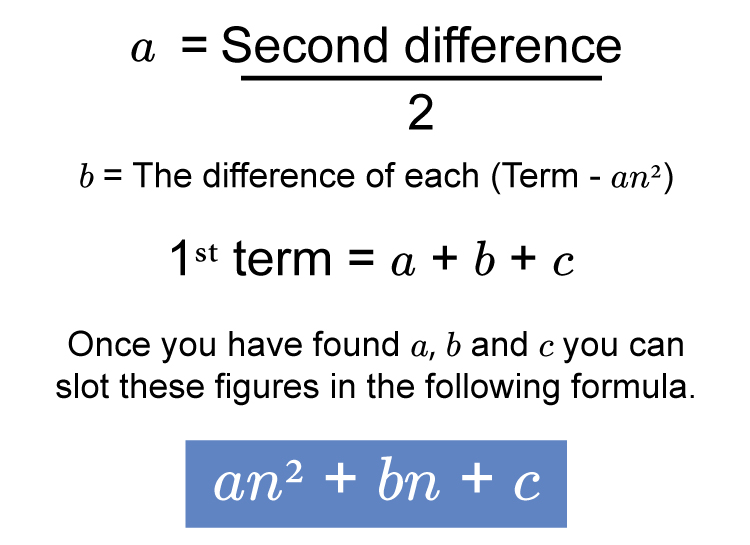
Example 1
We know the following sequence is a quadratic sequence but what is the formula for the `n^(th)` term?
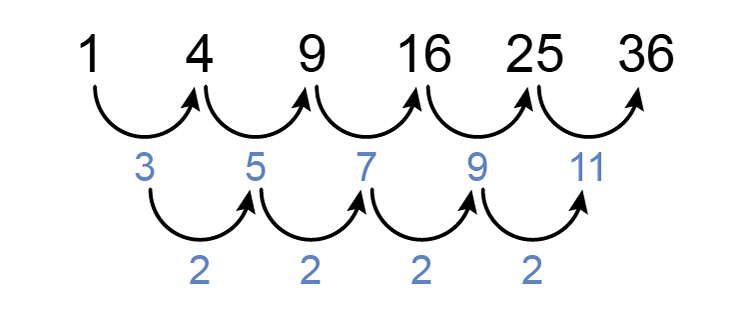
`a=(se\cond\ \ di\fference)/2=2/2=1`
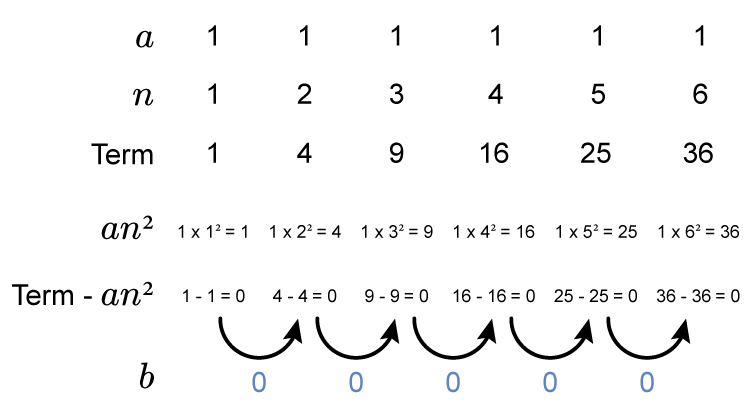
Therefore `b=0`
and because `1^(st)` term `=a+b+c`
`1=1+0+c`
`1-1=0+c`
`c=0`
Summary `a=1` `b=0` `c=0`
therefore the formula for the `n^(th)` term in this sequence is
`an^2+bn+c`
or `1n^2+0n+0`
which is `n^2`
Now we need to check the formula is correct.
Try different values of `n` in the formula `n^2`
If `n=1` term `=1^2=1`
If `n=2` term `=2^2=4`
If `n=3` term `=3^2=9`
If `n=4` term `=4^2=16`
This is correct
Answer `=n^2`
Example 2
We know the following sequence is a quadratic sequence but what is the formula for the `n^(th)` term?
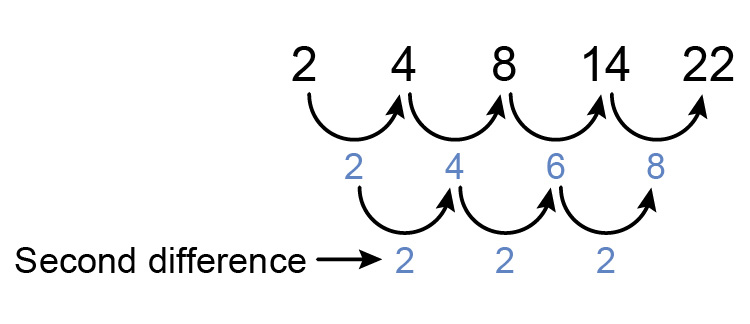
`a=(se\cond\ \ di\fference)/2=2/2=1`
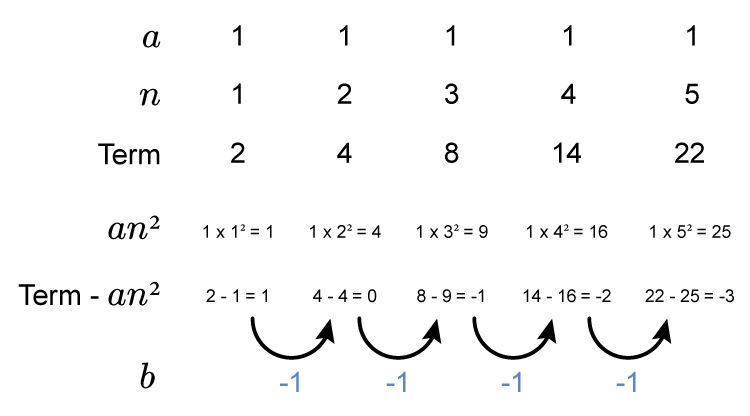
Therefore `b=-1`
and because `1^(st)` term `=a+b+c`
`2=1-1+c`
`c=2`
Summary `a=1` `b=-1` `c=2`
therefore the formula for the `n^(th)` term in this sequence is
`an^2+bn+c`
or `1n^2+(-1)n+2`
which is `n^2-n+2`
Now we need to check the formula is correct.
Try different values of `n` in the formula `n^2-n+2`
If `n=1` term `=1^2-1+2=1-1+2=2`
If `n=2` term `=2^2-2+2=4-2+2=4`
If `n=3` term `=3^2-3+2=9-3+2=8`
If `n=4` term `=4^2-4+2=16-4+2=14`
This is correct
Answer `=n^2-n+2`
Example 3
We know the following sequence is a quadratic sequence but what is the formula for the `n^(th)` term?
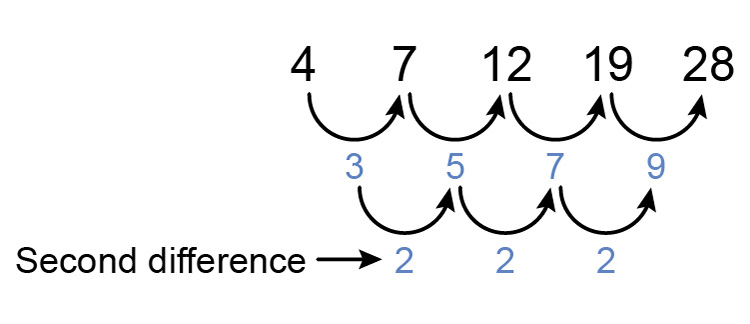
`a=(se\cond\ \ di\fference)/2=2/2=1`
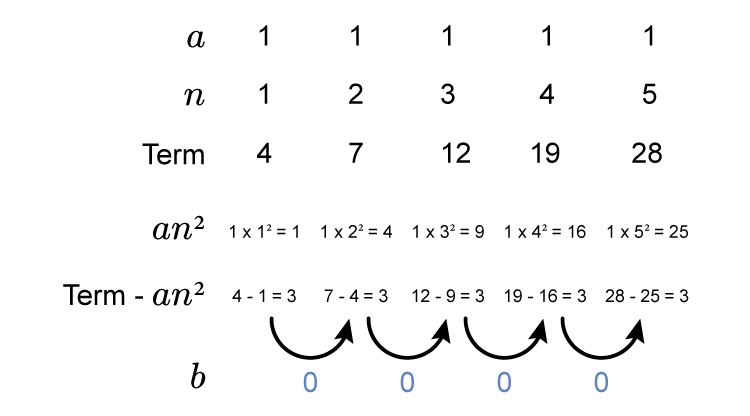
Therefore `b=0`
and because `1^(st)` term `=a+b+c`
`4=1+0+c`
`c=3`
Summarry `a=1` `b=0` `c=3`
therefore the formula for the `n^(th)` term in this sequence is
`an^2+bn+c`
or `1n^2+0n+3`
which is `n^2+3`
Now we need to check the formula is correct.
Try different values of `n` in the formula `n^2+3`
If `n=1` term `=1^2+3=1+3=4`
If `n=2` term `=2^2+3=4+3=7`
If `n=3` term `=3^2+3=9+3=12`
If `n=4` term `=4^2+3=16+3=19`
This is correct
Answer `=n^2+3`
Example 4
We know the following sequence is a quadratic sequence but what is the formula for the `n^(th)` term?
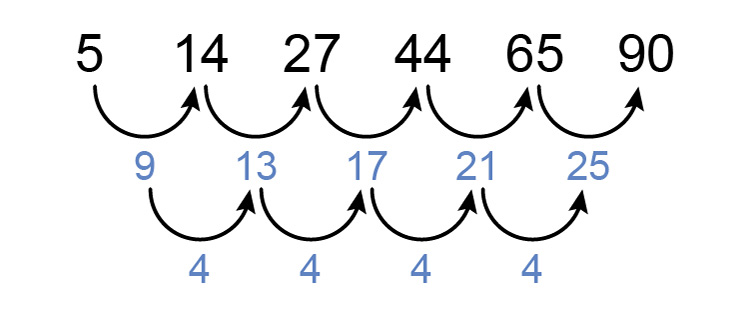
`a=(se\cond\ \ di\fference)/2=4/2=2`
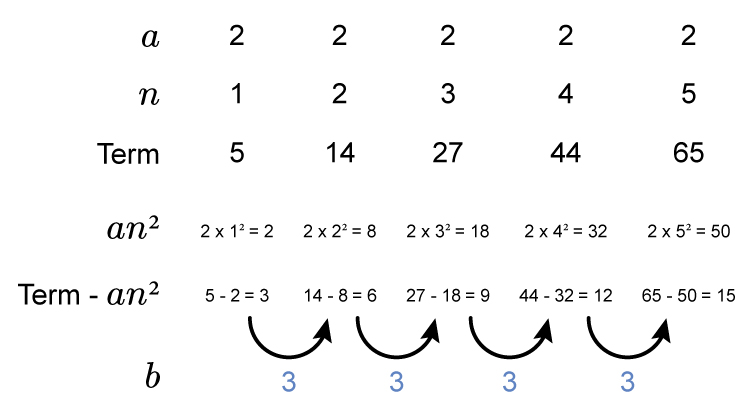
Therefore `b=3`
and because `1^(st)` term `=a+b+c`
`5=2+3+c`
`c=5-2-3`
`c=0`
Summarry `a=2` `b=3` `c=0`
therefore the formula for the `n^(th)` term in this sequence is
`an^2+bn+c`
or `2n^2+3n+0`
which is `2n^2+3n`
Now we need to check the formula is correct.
Try different values of `n` in the formula `2n^2+3n`
If `n=1` term `=2times1^2+3times1=2+3=5`
If `n=2` term `=2times2^2+3times2=8+6=14`
If `n=3` term `=2times3^2+3times3=18+9=27`
If `n=4` term `=2times4^2+3times4=32+12=44`
This is correct
Answer `=2n^2+3n`




